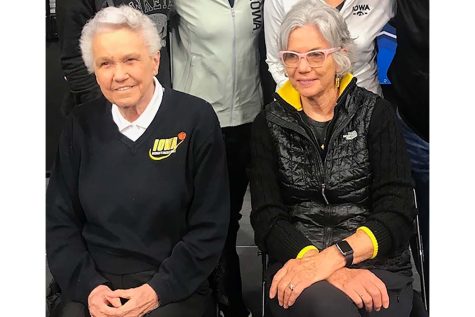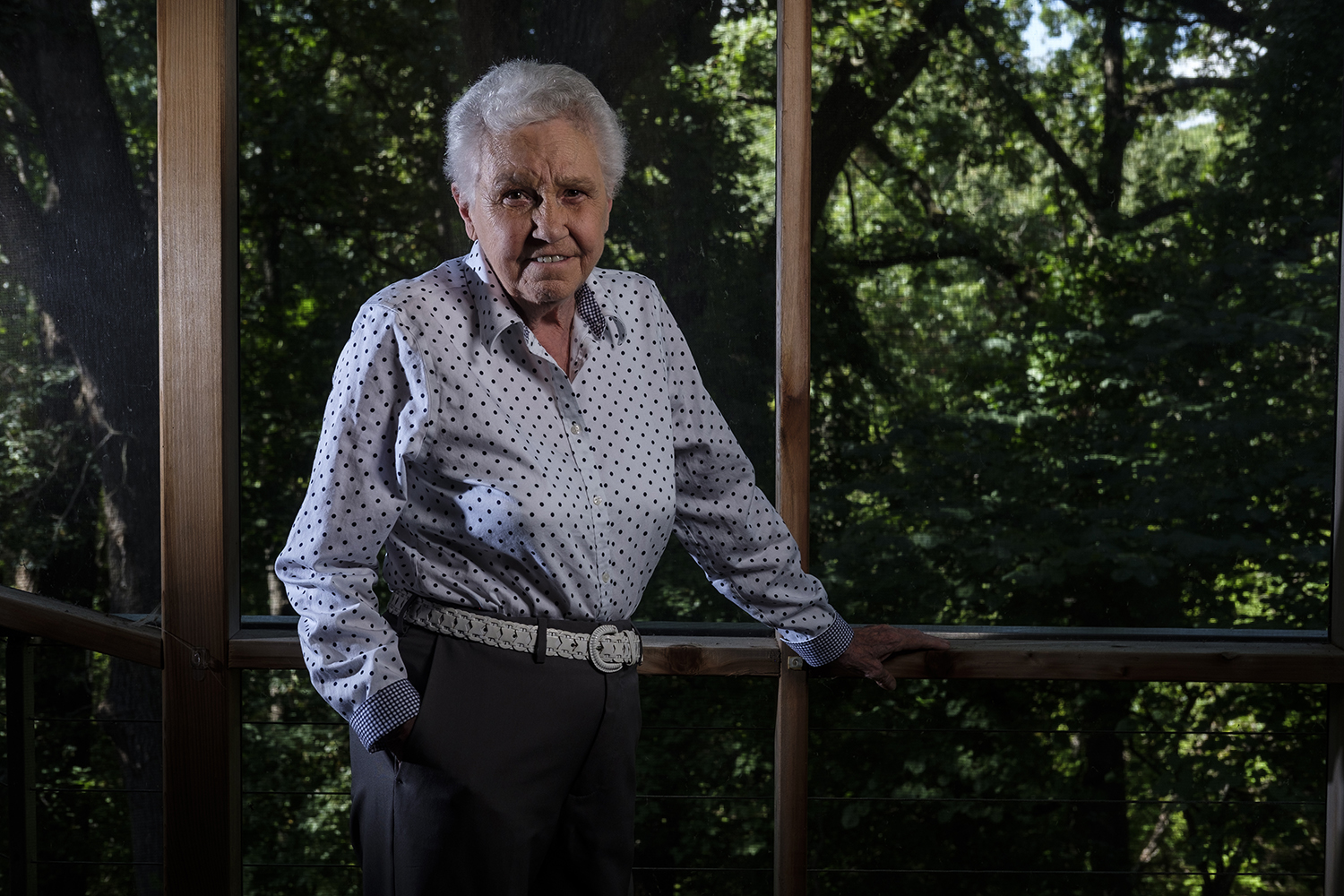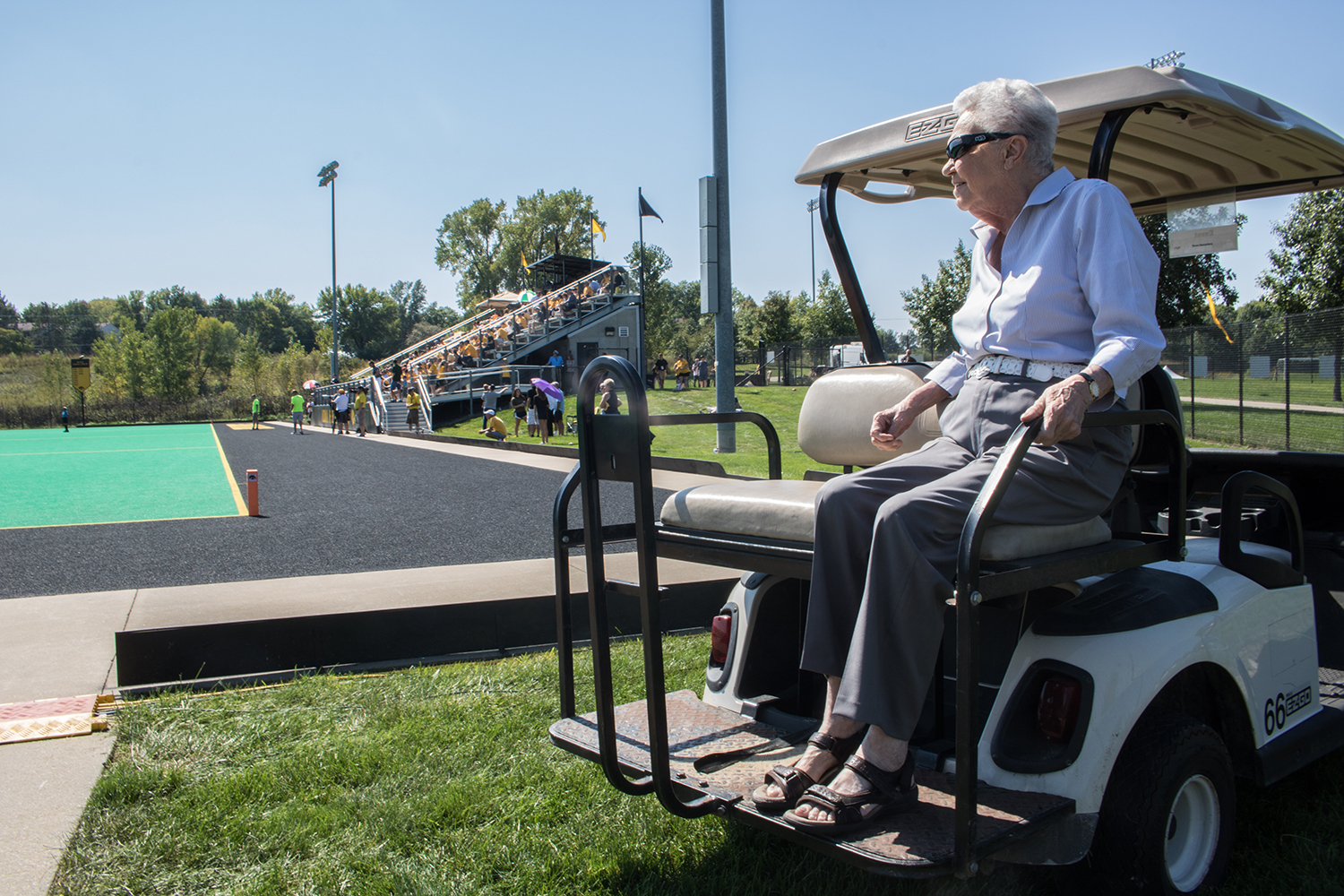The legacy of Christine Grant: Title IX and Iowa Athletics
In the 50th year of Title IX, The Daily Iowan examines the former athletic director’s impact and Iowa Athletics’ commitment to the advancement of women’s sports.
March 29, 2022
Lark Birdsong, the Iowa women’s basketball program’s first head coach, didn’t start playing the sport in an organized fashion until she was in college.
Birdsong was a four-year letterwinner at the University of Northern Colorado in tennis, basketball, and volleyball from 1968-72. Although colleges weren’t required to provide equitable sporting opportunities at the time, Birdsong said Northern Colorado was ahead of its time.
“I liked [basketball] as an activity when I played with my brothers,” Birdsong said. “… It was the only thing in the winter slot, and I knew I enjoyed it.”
Former Iowa Director of Intercollegiate Athletics for Women Christine Grant took a chance on Birdsong when she brought her to the university in 1974. Birdsong had just completed her master’s degree in physical education at the University of North Carolina, and Grant was producing a new varsity women’s basketball team to help the University of Iowa become compliant with Title IX and picked Birdsong to lead the charge.
The Title IX segment of the Education Amendments of 1972, which states, “no person shall, on the basis of sex, be excluded from participation in, be denied the benefits of, or be subjected to discrimination under any academic, extracurricular, research, occupational training, or other education program or activity,” had been passed two years prior.
“I was hired because it was part of Iowa’s commitment to opportunities for women at the collegiate level,” Birdsong said. “And so, there were a whole bunch of women that were hired to coach women’s sports at the time.”

Grant advocated for equality between men’s and women’s collegiate athletics every step of her career. Testifying in front of the U.S. Congress multiple times, Grant was instrumental in making sure federally funded colleges and universities became compliant.
Her trailblazing efforts ensured equal opportunities for women in any collegiate sport at any school in the U.S. Grant died at the age of 85 on Dec. 31, 2021, but in the 50th year of Title IX, her legacy is still felt around the UI community and the nation.
Now, despite a recent Title IX lawsuit, Iowa Deputy Director of Athletics and Senior Women’s Administrator Barbara Burke is trying to continue Grant’s efforts and support the Hawkeyes’ female student-athletes.

Christine Grant posed for a portrait in her home on Friday, September 14, 2018. Grant was the first woman to be Athletic Director at the University of Iowa and was involved in the formation of the national Title IX policy.
Grant’s legacy on Iowa Athletics
Birdsong said she didn’t come into her position in 1974 focused on equity between the men’s and women’s basketball programs. Instead, she put her “heart and soul” into the development of the program.
But she still noticed numerous disparities between the men’s and women’s programs. Birdsong said there were large funding gaps in uniforms, practice jerseys, equipment, and transportation. Birdsong also couldn’t offer scholarships to her women’s basketball players. Her biggest frustration, she said, was the women’s program’s lack of locker room space.
“We did not have a dedicated locker room and I didn’t have a place where we could go at halftime,” Birdsong said. “We finally got a room in the Field House, and it was not designed for showers, facilities.”
Former Hawkeye men’s basketball coach Lute Olson, who was with the Hawkeyes from 1974-83, originally allowed the women’s team to use the men’s locker room. But that agreement had difficulties.
“It became somewhat of an issue because all of the [men’s] players’ items were just hanging in the particular facility,” Birdsong said. “They felt it wasn’t appropriate for us to be amongst all of the items that would just be left hanging out. So, we ended up not being able to use that for the long term.”
Title IX went into full effect in 1975. All high schools, colleges, and universities were given until July 21, 1978, to become compliant. That date passed with few schools being compliant. To help the progress, Grant was a consultant on the 1978 Civil Rights Title IX Task Force. She also sat on multiple NCAA committees while at Iowa, including the Special Committee to Review the NCAA Membership Structure, Special Committee on Assessing Interests of Female Student-Athletes, and Committee on Committees.
“She was committed to equality for girls and women, because of the shortchange that they were receiving when she first came over to this country,” Birdsong said.
Grant was Iowa’s director of women’s intercollegiate athletics from 1973-2000, until the men’s and women’s athletics departments merged into one. In her 27 years at Iowa, equality in women’s sports — both at the university and around the country — was her main focus. But Grant always made time for her student-athletes at Iowa, even when she was stretched across the country with numerous responsibilities.
“She was literally, like, fighting battles in Congress, and on the speaking circuit trying to represent women and women’s sports everywhere,” Iowa field hockey head coach Lisa Cellucci, a close friend of Grant, said. “And she was at the NCAA. So, she was very involved, and she was at all of the matches that she could be at, all of the big-time events.”
Iowa field hockey plays its home games on Grant Field — named after the Title IX pioneer — on the west side of campus.
Grant, who hailed from Scotland, was a field hockey enthusiast. She founded the Iowa field hockey program, a sport which is primarily played on the east coast of the U.S., in 1977. Originally named the Hawkeye Field Hockey Field, Iowa’s playing surface was dedicated to Grant on Sept. 22, 1991.
“Every time we walked on that field, we knew of course we’re playing for all the women that came before us, and for her,” Cellucci said. “It’s just a privilege, the opportunity that you have even just playing a sport.
“She was so fortunate, over in Scotland, to have access to great coaching and to be able to participate. And then when she came to the United States, it wasn’t the same. There was such disparate treatment between the woman and the men, and she could not get over it.”
Cellucci was a goalkeeper for Iowa field hockey from 1994-98, becoming a four-time All-Big Ten selection and three-time All-American. After leaving the state to begin her coaching career at James Madison University, she returned to Iowa ahead of the 2000 season as an assistant. In 2014, she became Iowa’s head coach.
Cellucci first met Grant when Cellucci was 17 and on an official visit to Iowa. From their first meeting, Cellucci knew Grant’s passion for Title IX and equality in women’s sports.
“She really made it very clear why Iowa was so different,” Cellucci said. “It was so obvious, just the pride, the passion, what they were trying to do for the female student-athletes, and it really set a lot of those Iowa teams apart in the early 90s when they were so successful.”
The pair had an hour-long conversation on Cellucci’s official visit to Iowa in 1993. When Cellucci mentioned during the meeting that she had a paper due on the subject of Title IX, she said Grant pulled out endless documents on the subject to help with her paper.
“Needless to say, I got an A on that project,” Cellucci said.
Cellucci played at Iowa in the final years before the men’s and women’s athletic departments merged. Everything was separate at the time, Cellucci said, including the sports information department, transportation, and equipment.
At the time, she said, it made the female student-athletes feel equal.
“You felt like, ‘Yeah, you were this big-time star, and you were getting you know what you deserved,’” Cellucci said.
Reflecting on her time as a student-athlete, she now realizes that everything wasn’t completely equal. But she still looks back on her college athletics years fondly.
“I was so unbelievably impressed and happy about my experience and the opportunities afforded to me,” Cellucci said. “… We were just fortunate to be surrounded by some such wonderful women and coaches and people. Like, there were just role models and everywhere we looked.”
Grant retired from her position at Iowa in 2000 ahead of the athletics department merger. But her advocacy for Title IX and equality in women’s sports never ceased.
Birdsong said that for over 15 years after Grant retired, people would ask for assistance in Title IX cases. Although they offered payment, Grant would take the funds and donate them back to the school or organization that she helped.
“She never wavered in her commitment to women and girls,” Birdsong said.
After she died, Grant left behind a pioneering legacy.
Timeline by Chloe Peterson/The Daily Iowan
“It’s one thing to really believe in something, but it’s another thing to … devote your entire life to championing that cause,” Cellucci said. “She truly did that, probably in every conversation in every setting that she was in and up until she died. She was still talking to people about how we could make opportunities better.
“We’re indebted to her forever, because I wouldn’t be in the position I am, or my student athletes would not have the opportunity to be competing on this stage if it wasn’t for someone like Christine Grant.”

Iowa’s Deputy Director of Athletics, Senior Women’s Administrator, and Chief Operating Officer Barbara Burke poses for a portrait in Carver-Hawkeye Arena on Friday, Feb. 18, 2022.
Burke fills senior women’s administrator role
After the UI men’s and women’s athletic departments merged into one in 2000, then-Iowa men’s athletic director Bob Bowlsby oversaw both the men’s and women’s sports. Now, Gary Barta has been at the helm of Hawkeye Athletics since 2006.
But Iowa Athletics still has a specific person to help and advocate for women’s sports. Burke has filled the position of Iowa’s Deputy Athletics Director and Senior Women’s Administrator since 2017.
Burke came to the UI in 2016, starting as the Senior Associate Athletics Director of Sport Administration and Event Management. She also served as the director of athletics at Eastern Illinois University for six years.
According to the NCAA, a senior women’s administrator is the highest-ranking woman in each college or university athletics department. The title was developed to provide support for female student-athletes.
“Senior women’s administrator, I take that as an individual that is not focusing just on women,” Burke said. “Because I’m responsible across the board, men or women. But I can provide leadership to our females.”
Burke said she has multiple initiatives at the UI to help support her student-athletes. She started HERky’s Voice, a podcast hosted by Iowa women’s tennis coach Sasha Schmid. The podcast highlights women throughout the Iowa Athletics department.
Three to four times a year, she said, she hosts ‘Coffee with Barbara’ for all women in the department. Burke brings in women in leadership positions around the country to present.
“I want the staff to see, ‘Hey, there’s other people here that look like you that are aspiring to what you’re doing, or to even higher levels,’” Burke said.
Burke also helps with day-to-day operations of the Iowa women’s basketball program. When the Hawkeyes had multiple Big Ten games postponed because of COVID-19 issues, Burke was the one to work with the conference to make sure Iowa completed its 18-game conference season in its entirety.
Iowa completing its full season helped the Hawkeyes win the Big Ten regular season championship. Michigan finished one game behind Iowa in the Big Ten standings, and the Wolverines let a regular-season conference game against Illinois — the worst team in the league — go unplayed after it was postponed because of COVID-19.
“She worked so hard with the Big Ten schools to get the games rescheduled for us,” Iowa head coach Lisa Bluder said following Iowa’s regular season championship. “And we went through a lot of different scenarios.”
Burke also helped the Iowa women’s basketball team sell out Carver-Hawkeye Arena three consecutive times — the regular season game against the Wolverines on Feb. 27 and the first two rounds of the NCAA Tournament at Carver-Hawkeye Arena on March 18 and 20. Iowa’s 14,382 ticketed fans in the first rounds of the NCAA Tournament broke a single-site attendance record.
Before this season, Iowa women’s basketball had not seen a sold-out crowd since Jan. 31, 1988. Grant was behind that sold-out crowd, as she enlisted the help of Hayden Fry, Dan Gable, and Bump Elliot to promote the game on TV. Grant packed 22,167 people — 7,000 above Carver’s capacity — into the crowd. At the time, it broke the record for NCAA attendance at an intercollegiate women’s basketball game.
“Dr. Grant was so special to me, and she was just such a great mentor,” Bluder said. “Every time I step on the floor I’m wearing my tennis shoes in honor of her. She told me I needed to wear sensible shoes. She’s just really special. It’s just all those little girls getting the opportunity to play sports.”
When Burke was growing up, she didn’t have an opportunity to play organized sports. Now, Burke hopes her powerful position as deputy athletic director shows her female student-athletes what they’re capable of.
“I hope it helps them see that they do have leadership,” Burke said. “They do have advocates, and you don’t have to be a female to be an advocate for women’s sports, right? And you don’t have to be a male to be an advocate for male sport. For me, Title IX is not men versus women. Title IX is creating opportunities.”

Swimmers compete during the second session of the the 2020 Big Ten Women’s Swimming and Diving Championship at the the HTRC on Friday, Feb. 21, 2020.
Iowa Athletics faces Title IX lawsuit
Iowa settled a Title IX noncompliance lawsuit with four former Hawkeye women’s swimmers — Sage Ohlensehlen, Kelsey Drake, Christina Kaufman, and Alexa Puccini — in September 2021.
The four athletes brought the lawsuit against the UI in September 2020 after the athletic department announced that it would cut men’s and women’s swimming, men’s tennis, and men’s gymnastics after the 2021-22 academic year.
“It was hard to see all the sports [cut], men’s or women’s, didn’t matter to me,” Burke said. “It’s just that that was such an, still is, a really difficult financial burden that we had to deal with. Nobody wanted to do it. The athletic director didn’t want to do it. But sometimes we have to make decisions that are best for the good of the order.”
The former Hawkeye women’s swimmers alleged the university did not have equal opportunities for female athletes compared to its student population — a pillar of Title IX. The lawsuit said that women make up 53.56 percent of the population, they only received 50.77 percent of athletic opportunities dating back to the 2018-19 academic year.
“I’ve always tried to say we make the best decisions we can make with the best information that we have at the time,” Burke said. “I’m very confident in what we’re doing on behalf of our women’s sport programs. I believe that we’ve been in compliance, it’s our intention to be in compliance. And I focus a lot on the opportunities that we provide.”
A federal judge temporarily reinstated the women’s swimming program on Dec. 22, 2020. The university officially reinstated the women’s swimming program in February 2021. The men’s swimming, tennis, and gymnastics programs were still discontinued, however.
The women’s swimmers and the UI settled for a monetary sum of $400,000, including $307,000 in attorney fees and $92,000 in litigation costs. Iowa will need to keep women’s swimming as a varsity sport for at least seven years.
Additionally, Iowa will be required to enforce a roster cap on the rowing roster. The lawsuit alleged that the athletic department was stashing female athletes on its rowing team to stay in compliance with Title IX. In 2014, there were 89 student-athletes on the Hawkeye rowing roster, while the NCAA average was 64. The UI agreed to a rolling three-year roster cap of 75.
The settlement also mandated that the university had to add a new women’s sport. Iowa chose to become the first Division I Power Five school to sanction women’s wrestling as a varsity sport, announcing the addition on Sept. 23, 2021. The women’s wrestling program will start team competition in 2022-23.
“This is a huge victory,” Ohlensehlen told The Daily Iowan in September 2021. “I think the thing that’s very important to remember is that Iowa is adding this wrestling program because of the lawsuit. The lawsuit is the catalyst for this program being added. I’m so happy that Iowa is taking these steps for equality, and I’m hoping that this case will set a precedent for all other schools. I think it’s about time that every school out there, every Division I-qualified school, should really take a look at their rosters and make sure that they are offering equal amounts of opportunities to both men and women.”
Ohlensehlen, a law school student at Southern Methodist University in Dallas, Texas, led the push for the lawsuit while she was still a student at Iowa. Although she faced criticism from her Hawkeye peers, she said she’s proud of the end result.
“The fact that I’m able to close this chapter of my life, knowing that I did something that’s going to make a difference in 70 young women’s lives a year, that’s amazing,” Ohlensehlen said. “Because they have 35 wrestlers and 35 swimmers and divers that are going to be able to compete as D1 athletes every single year.
“That is the coolest thing. And I consider that to be my greatest achievement in my whole life.”
